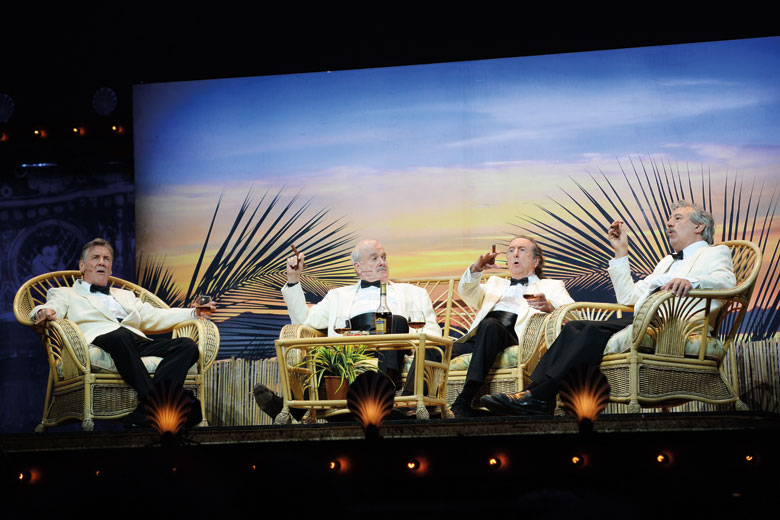A new academic year heralds not only the arrival of a fresh cohort of students. It is also when many young academics set about teaching their first courses and establishing independent research programmes. We asked six senior scholars to pass on one piece of advice that all new – and not-so-new – academics should heed.
Tame the lions
University teaching, especially lecturing to large numbers of people, can be terrifying when you start out. Confronted with a sea of faces, looming towards you from the raked seating, the tyro academic can feel like simply running away. This is what I would have done before my first lecture as a clueless PhD student had a couple of friends not frogmarched me towards the lectern. I proceeded to gabble my way through an hour’s worth of densely argued material in just 20 minutes and then made my escape, thinking that perhaps this profession was not for me.
And so it continued into my first “proper” academic job. Then two things happened at the same time that transformed my approach to lecturing. First, I overheard some mature students coming out of one of my full-pelt efforts. “She’s scary, isn’t she?” said one. “No,” responded the other, “I think she is scared.”
It was a shock to realise that at least one student had noticed. Then a more experienced colleague gave me the tip that I want to share. Lecturing is like lion-taming, he said. You must never let the lion know that you are afraid of it.
This insight stayed with me. I stopped turning up with a fully written script, putting my head down and trying to get through it as quickly as possible. Instead, I started tuning into the idea of a lecture as a performance. I was the ringmistress and the students were the lions: they could eat me alive, but they weren’t to realise that amid the lash of my rhetoric and the charisma of my delivery. I’m being a little facetious, but the point is a serious one. I even dressed up on occasion in 17th-century costume to reinforce the theatrical dimension of what I was doing (which went down incredibly well once the students had stopped giggling).
So my advice is this: if you are struggling to get over those initial nerves, try using the lion-taming metaphor as a mental prop. Imagine yourself standing on a podium in a tailcoat and top hat, carrying a long lash, with the ranks of students standing in for the savage beasts. It’s your job to show them who’s boss: to control as well as to entertain them. You have the whip hand, so the fact that all the eyes are upon you should be energising rather than intimidating. Relish your performance and, trust me, you’ll take the students with you. With any luck, the fearsome felines of your anxious imagination will be tamed once and for all.
Tracey Hill is associate professor of early modern literature and culture at Bath Spa University.

Rock the work-life balance
As a young, hard-pressed academic, you’ve probably been advised to put up rigid boundaries between academic commitments and downtime in the world outside. I would urge you instead to blur those boundaries.
I certainly didn’t get my work-life balance in order when I started as a lecturer in 1997. Seventy- to 80-hour weeks were the norm (and are still not unusual among academic physicists), although these were, of course, severely curtailed when kids came along a little later.
Yet a significant proportion of those long pre-kids weeks didn’t feel like work at all. And that was because much of my research and teaching in effect involved indulging my hobbies. My first major teaching task was a revamp of our second-year undergraduate laboratory course to incorporate much more computer-controlled experimentation. I can trace why I became a physicist back to building rudimentary circuits on a piece of wood with my radio ham uncle when I was primary school age (using drawing pins to hold the components in place) and, a few years later, programming a Sinclair ZX81 as a teenager. So when it came to the lab course redesign, I was in my element.
Ever since then, I’ve always tried to bring my other hobbies and outside interests into the lecture theatre and research lab. For instance, I’m a huge fan of rock music, including – whisper it – heavy metal. There are deep and fundamental links between heavy metal and quantum physics. No, really. Quantum confinement, the Heisenberg uncertainty principle, simple harmonic oscillators – all can be explained in the context of guitar, bass and drums turned up to 11. And I’ve tried to exploit these links to the hilt in undergraduate lectures over the years.
Similarly, on the research side, and in parallel with our group’s core activities in nanoscience, projects on the physics of rock music have led to new collaborations and stimulated new ways of thinking about data analysis. These include, most recently, a study of temporal correlations and fluctuations in the drumming patterns in Rush’s classic track Tom Sawyer. That work, which formed the basis of an undergraduate project, was inspired by a paper published last summer, by Esa Räsänen and colleagues at Finland’s Tampere University of Technology and at Harvard University, on the dynamics of Jeff Porcaro’s virtuoso drumming. A couple of years before that, a team led by Jesse Silverberg – then a PhD student at Cornell University – applied statistical physics to the behaviour of crowds at heavy metal gigs, producing a fascinating, “independently funded” paper with the best title ever seen in a prestigious physics journal: “Collective motion of humans in mosh and circle pits at heavy metal concerts”.
Surprisingly, not everyone is a fan of rock and metal music. The same principle, however, holds for all those other, rather less histrionic, outside interests. Incorporating our hobbies – be they sport, music, art, photography or haberdashery – into the academic sphere can enliven both teaching and research. An especially fascinating and inspiring example is Richard Taylor’s work on the fractal analysis of Jackson Pollock’s drip paintings. Taylor, currently professor of physics, psychology and art at the University of Oregon, has built a highly successful research career in physics on his keen interest and talents in painting and photography.
The expectations and workload in the early years of your lecturing career can be daunting. Try to keep in mind what enthused you about your subject in the first place, and don’t stress too much about striving for the perfect work-life balance. There’s nothing wrong in letting at least some of your life be your work. If a study by Robert Root-Bernstein and co-workers at Michigan State University in 2008 is to be believed, indulging your hobbies might even help you win a Nobel prize.
Philip Moriarty is professor of physics at the University of Nottingham.

Don’t just turn up: be present
The one thing that has made the biggest difference in my teaching and in my professional life more generally is to practise being present. That sounds simple: you’re the one teaching the class, so you have to be there for it. But there are many ways to physically be somewhere, and even to perform well, without fully being present, with all your attention and energy.
For example, if I’ve overprepared because I’m teaching a new course, it’s easy to walk into the class with my brain full of ideas and information that won’t reach my students because I’m not paying attention to who they are, or to what they know or don’t yet know. If I’ve been rushing to get to class from a meeting, or I’m concerned about a deadline or family situation, it’s easy to be distracted or tense and therefore not fully present when I walk into class.
So I practise being present. I use the word “practise” here deliberately, in the same way I refer to my yoga practice: it’s something that I do consistently with the intention of improving. It’s something that I’m still learning how to do: something that I don’t always get right. But when I am able to be fully present in the classroom, I can listen more attentively to questions and comments; I can respond more fluidly; and I am able to make connections that I might not have previously planned.
The easiest thing to do is to take a minute or two before class to stop, breathe deeply and set your intention for the upcoming hour. Whenever possible, keep the last 10 to 15 minutes before class for yourself. Although it can be tempting to prepare for class right up until it starts, a better approach is to use that time to walk, stretch and clear your mind. The power poses recommended by Harvard psychologist Amy Cuddy can also be helpful if you feel nervous before class.
Another way to practise being present is to focus on who’s in front of you, rather than on who’s not there. Teach the students who came to class with all your energy and enthusiasm. The same holds true in delivering a conference paper to a small audience.
Although new lecturers might be wary of trying this approach, I start each class with one minute of “breath work”. I set a timer, ask students to close their eyes and guide them in a simple breathing exercise. I mention the research behind this practice on the first day of term, explaining that breathing with the eyes closed helps calm the nervous system and allows the mind to focus. (Of course, if some students don’t wish to participate, that’s fine; I just ask that they sit quietly so as not to disturb others.) This simple activity has dramatically improved the quality of attention and discussion in my classes and students routinely comment in evaluations that it is something they find helpful.
Practising these tips takes only a minute or two, and helps create a calm, focused learning environment that benefits you and your students.
Natalie M. Houston is associate professor of English at the University of Massachusetts Lowell and a personal productivity coach for academics and professionals.

Don’t follow the research herd
If everyone likes your work, I tell incoming young faculty at my university, you can be certain that you haven’t done anything important.
The pressures on young researchers are to conform, to accept fashionable ways of analysing problems and, above all, to please senior professors and peers. Unfortunately, this is bad for scientific progress. If you really want to produce significant research – the kind of research that changes how a profession thinks and furthers what we know about the world – then conflict and pain go with the territory. That is the central lesson I had to learn.
The main difference between world-class researchers and sound researchers is not intellect; it is energy, single-mindedness, more energy and the ability to withstand what will sometimes feel like never-ending disappointment, tiredness and psychological pain. Tenacity is almost everything.
When it comes to publication, for example, I advise people to start writing and submitting articles as early as possible, rather than polishing them for years, way beyond the point of efficiency. And to try to submit them to the very best journals – and accept the pain of rejection letters.
Don’t get dragged into whatever seems trendy this year. The topic was probably flagged up 10 years ago in some research corridor on the other side of the world and, at the absolute frontier, is already on its way out. The best idea is to work on important, timeless, deep questions that most people have not thought of or think are too hard. If people say to you “but nobody works on Z”, then you may have a chance of doing something of lasting value.
Go to all the seminars that you can, in all areas of your discipline. If you concentrate too narrowly at the start of your career, you have little chance of achieving vision. The reason why many researchers burn out in middle age is that they have gone obsessively narrow in their youth. Adaptability pays off – and you may work for half a century. By 2066, you won’t believe how quaint and poor the thinking was in your discipline in 2016.
It is at this stage of your life that you have the opportunity to fashion a whole stream of work about whatever you believe is important in the world. I suggest that you think long term. I realise that this is not easy, but try to remember that you have extraordinary intellectual talent. Work on what you believe in; it will help sustain you.
Andrew Oswald is professor of economics and behavioural science at the University of Warwick.

Never trust a machine
No matter how many lectures you have attended, starting to present your own from the other side of the lectern is always challenging. While getting the tone and content right is obviously crucial, you also need to get to grips with today’s teaching technology. Computers can be fickle servants at the best of times, but when confronted by an urgent need and a large audience they can become a truly destructive force – unless you show them who is boss.
The key to success is following my technology survival mantra of A, B, C: Assume Nothing, Believe No One, Check Everything. This may sound unduly pessimistic, but when you start out as a lecturer you want to ensure that your teaching goes as seamlessly as possible. Even once you think you’re beginning to communicate effectively with your students, a new venue can easily throw up a fresh range of technological headaches. So be prepared for what lies ahead.
Your first challenge is to get into the room, as you probably need your shiny new ID card to unlock the door – assuming that you have been authorised for access. Once you are inside, the lights will hopefully ooze gently up to reveal the cosy, raked seating and the complex command centre in front of the screen.
This shiny, sophisticated starship console has replaced the elegant teak bench in many institutions, but you now need to attend a course to stand a reasonable chance of successfully driving the functions of the lecture theatre. If someone offers you training, take it. If all else fails, the standard IT solution of rebooting the entire room will often solve problems of wildly confused settings.
Once logged in, remember that the data projectors are now copying your every digit and pixel to the 10-metre-wide screen behind you – so check that absolutely nothing that could spawn an awkward conversation appears on your desktop. If you are using your own laptop or tablet, remember to turn off all updates, instant messaging, Skype and anything else that might pop up in the middle of your talk – such as a mate sending you a photo of their latest tattoo or piercing...
Particularly when you haven’t lectured in a particular venue before, it is always worth sneaking in a day or two beforehand to ensure that your presentations all work with the versions of the software that are installed on the lecture room PC. Being told that your files are “corrupt” as the room fills with students isn’t a good feeling. Keep versions of your teaching material on a range of media: SD card, USB stick or CD-ROM, in addition to the copy on the server – as well as always having a paper version to work from if the technology really does the big firework on you. It may sound paranoid, but I also keep parallel versions of my files in PDF format to use as a last resort. I have needed them on a worrying number of occasions.
John Gilbey is a tutor in computer science at Aberystwyth University.

Don’t be a Yorkshireman
PhD supervision is an Eton mess of experience and expertise, ideology and imaginings. My key tip is never to commence a sentence with the words, “When I did my PhD.” This phrase is the start of a cacophony of assumptions, missteps, confusions and nonsense.
Experience is an unfortunate mistress in doctoral education. The greatest gift that a supervisor can bestow on a postgraduate is not their experience of a candidature, but their expertise in research. There is no other area of university life where a sample size of one – a single person’s experience of PhD supervision – is generalised, normalised, perpetuated and performed throughout an entire career.
Senior academics in particular should reflect on all the changes to schooling, higher education, teaching, learning and research in the past 20 years. Think about regulation and governance, neoliberalism and quality assurance. Think about the casualised precariat that is masquerading as a higher education workforce. Do you really believe that “when you did your PhD” bears any relation to the contemporary university system?
When you did your PhD, we knew less about why students enrol and very little about why students left a doctoral programme. Because of the high quality of doctoral studies as an emerging research area, our knowledge is growing about success, failures and the challenges in our system.
Talking about “when I did my PhD” individualises success and failure. So many of our PhD candidates – anywhere between 30 and 60 per cent, depending on the nation and the discipline – do not graduate. This is an institutional problem. This is a sector-wide problem. Yet we continue to blame the individual student, because “when I did my PhD”, I worked hard. I sacrificed. I published in the best journals. I taught throughout the candidature. Such perspectives resemble Monty Python’s Yorkshiremen sketch. “PhD students these days just don’t know how to suffer like we suffered. I didn’t have sex for three years.”
“Sex? Hell, I didn’t sleep in a bed.”
“A bed? I didn’t lie down for three years: I just slouched on a bench.”
“You had a bench? Luxury…”
Force yourself, instead, to read the research about international doctoral education. Undertake training in supervision – not because it is compulsory or a compliance mechanism but because you want to improve your andragogy.
PhD students are our future. They deserve better than a sepia-tinted past slopped out of a cup of experience.
Tara Brabazon is dean of graduate research at Flinders University, Australia.

Don’t be in the classroom for yourself
“Kill your ego.” “Remember that teaching is first and foremost about the students.” “Give everything you have, every day.” Dramatically and suddenly I discovered the truth of all this in 1978, during the weeks after attending the funeral of 20-year-old Kelly, one of my students.
Bright, blossoming, full of life – anyone who knew Kelly saw in her the promise of great things. Her death felt all the more poignant for me because when her Volkswagen was hit broadside by a van, killing her instantly, I was waiting in my office for her to arrive for an 11am appointment to discuss her plans to complete her undergraduate degree, go on to graduate studies and eventually become a teacher herself.
Now she was gone, yet for many weeks after the funeral, the image of Kelly lingered in my mind as I wondered whether anything I had said in class had made a difference to her too-short life – or, for that matter, to the lives of any of my students. For the first time in my life as a teacher – and I had been at it for only five years – I realised that I wasn’t in the classroom for myself. I was there for the students, all of whom were giving me three hours a week of their most precious possession – their time.
What we say and do should make a difference in our students’ lives. As a result, I committed to setting aside my graduate school ego, placing my students first in everything I do and always going the extra mile in my preparations, discussions, lectures and daily assistance with their work. That conscious transition from being a teacher who is inner-directed to one who is outer-directed transformed my approach to my profession – and continues to yield all sorts of intangible rewards.
Dale Salwak is professor of English at Citrus College in Glendora, California.
POSTSCRIPT:
Print headline: Old-school rules
Register to continue
Why register?
- Registration is free and only takes a moment
- Once registered, you can read 3 articles a month
- Sign up for our newsletter
Subscribe
Or subscribe for unlimited access to:
- Unlimited access to news, views, insights & reviews
- Digital editions
- Digital access to THE’s university and college rankings analysis
Already registered or a current subscriber? Login




